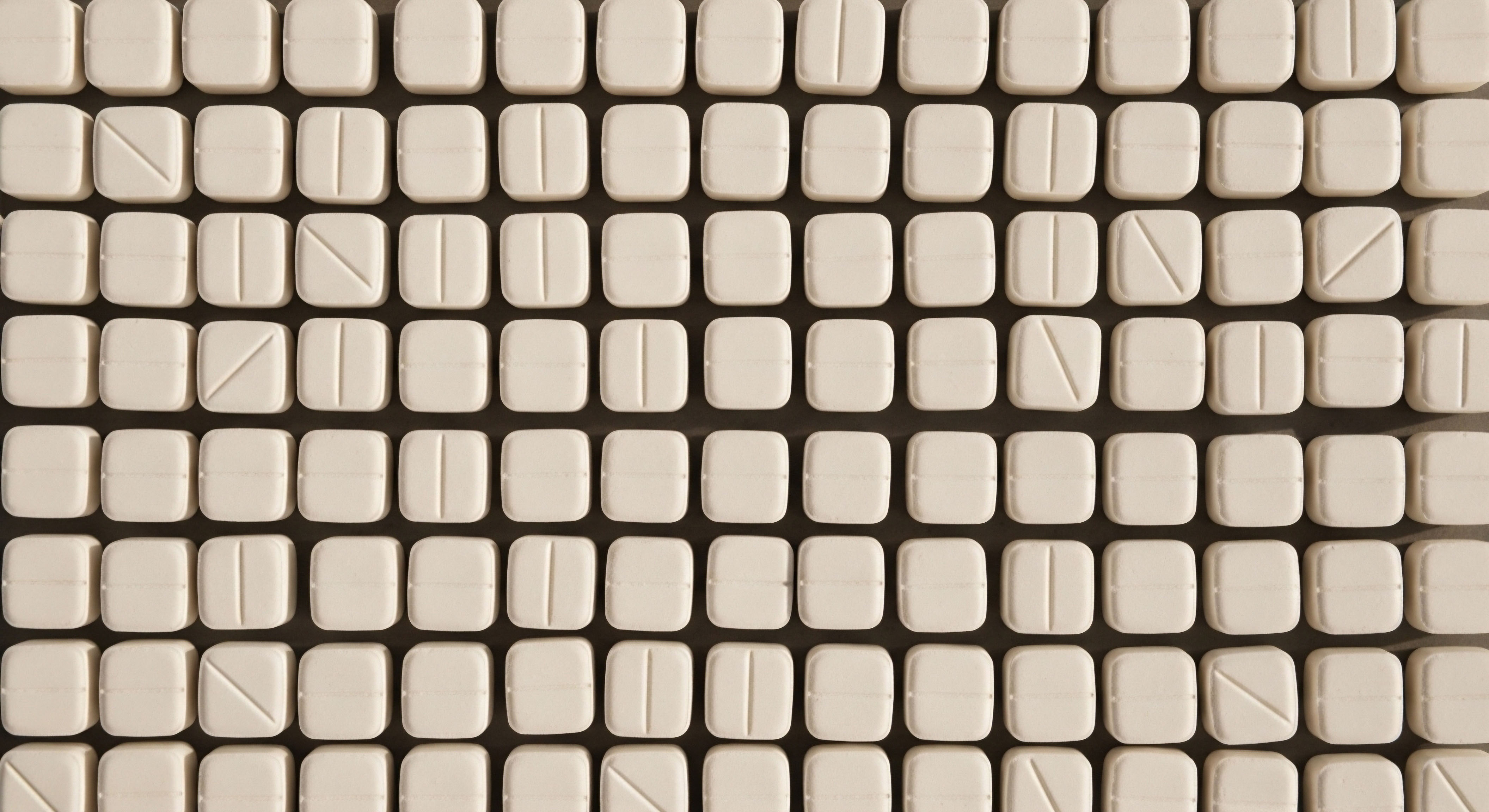

Fundamentals
Have you ever found yourself searching for a word that feels just beyond your grasp, or walking into a room only to forget why you entered? Perhaps you notice a subtle shift in your ability to recall names or details from conversations.
These moments, often dismissed as simple signs of aging, can stir a quiet concern, a feeling that something fundamental about your cognitive sharpness is changing. This experience is deeply personal, yet it reflects a broader biological reality ∞ our internal systems, particularly the intricate dance of hormones, undergo transformations as we age. Understanding these shifts is the first step toward reclaiming a sense of vitality and function.
The human body operates as a symphony of interconnected systems, with the endocrine system serving as a central conductor. This network of glands produces and releases chemical messengers known as hormones, which travel through the bloodstream to regulate nearly every physiological process. From metabolism and mood to energy levels and reproductive function, hormones orchestrate our internal environment. When this delicate balance is disrupted, the effects can ripple throughout the body, manifesting as a range of symptoms that affect daily living.
Among these vital chemical messengers, testosterone holds a significant position, particularly for men, though it plays a crucial role in women’s health as well. While commonly associated with male reproductive health and secondary sexual characteristics, its influence extends far beyond. Testosterone contributes to bone density, muscle mass, red blood cell production, and even psychological well-being.
As men age, a gradual decline in testosterone levels, often termed andropause or late-onset hypogonadism, becomes a common occurrence. This decline is not merely a statistical observation; it can manifest as tangible changes in energy, body composition, sexual desire, and, for some, cognitive clarity.
Hormonal balance is a cornerstone of overall well-being, influencing everything from physical vigor to mental acuity.
The brain, a highly metabolically active organ, is particularly sensitive to hormonal fluctuations. Testosterone receptors are distributed throughout various brain regions, including the hippocampus, a structure critically involved in memory formation and spatial navigation. This anatomical presence suggests a direct role for testosterone in supporting cognitive processes. When circulating testosterone levels diminish, the brain’s ability to maintain optimal function can be compromised, potentially contributing to the subjective cognitive complaints many older adults experience.
Recognizing these connections allows us to move beyond simply accepting age-related changes as inevitable. Instead, we can begin to explore how supporting our endocrine system might offer a path to mitigating these symptoms. The goal is not to defy the natural aging process, but to optimize our biological systems, allowing us to maintain cognitive sharpness and overall vitality for as long as possible.
This personalized approach to wellness acknowledges the unique biological blueprint of each individual, paving the way for targeted interventions that truly address the root causes of discomfort and decline.

The Endocrine System and Brain Health
The endocrine system’s influence on the brain is extensive, shaping everything from neurotransmitter synthesis to neuronal survival. Hormones act as signaling molecules, binding to specific receptors on brain cells to initiate a cascade of biochemical events. For instance, thyroid hormones are essential for brain development and metabolic regulation within neural tissues. Cortisol, a stress hormone, can affect hippocampal function and memory under chronic elevation. The intricate interplay among these hormones underscores the systemic nature of cognitive health.
Testosterone, along with its metabolites, participates in complex feedback loops within the hypothalamic-pituitary-gonadal (HPG) axis. The hypothalamus releases gonadotropin-releasing hormone (GnRH), which signals the pituitary gland to produce luteinizing hormone (LH) and follicle-stimulating hormone (FSH).
These gonadotropins then stimulate the testes in men to produce testosterone, or the ovaries in women to produce estrogens and progesterone, along with smaller amounts of testosterone. This regulatory circuit ensures that hormone levels are maintained within a physiological range, responding to the body’s needs. Disruptions at any point in this axis can lead to hormonal imbalances that affect cognitive function.

Testosterone’s Role beyond Reproduction
Beyond its well-known reproductive functions, testosterone contributes significantly to systemic health. It plays a part in maintaining red blood cell mass, influencing erythropoiesis in the bone marrow. This hormone also supports bone mineral density, helping to prevent osteoporosis, a condition often associated with aging.
The impact on muscle strength and lean body mass is also well-documented, contributing to physical function and metabolic health. These systemic effects indirectly support brain health by ensuring adequate oxygen delivery, structural integrity, and metabolic efficiency.
The decline in testosterone levels with age, often referred to as age-associated hypogonadism, is a gradual process. Unlike the more abrupt hormonal changes experienced by women during menopause, male hormonal shifts are typically more subtle and protracted. Symptoms can be non-specific, including fatigue, reduced libido, mood changes, and a decrease in overall well-being.
For some individuals, these changes also encompass a perceived decline in cognitive abilities, such as slower processing speed or difficulty with verbal recall. Addressing these symptoms requires a careful assessment of an individual’s unique hormonal profile and overall health status.


Intermediate
When considering interventions for age-related hormonal shifts, particularly those affecting cognitive function, a clinically informed approach is paramount. Personalized wellness protocols aim to recalibrate the body’s internal messaging system, restoring balance and optimizing physiological function.
Testosterone Replacement Therapy (TRT) represents a primary strategy for addressing low testosterone levels in both men and women, with specific applications tailored to individual needs and symptoms. The objective is to restore testosterone to a physiological range, thereby supporting overall well-being, including cognitive vitality.
For men experiencing symptoms of low testosterone, a standard protocol often involves weekly intramuscular injections of Testosterone Cypionate. This form of testosterone is a long-acting ester, allowing for stable blood levels over several days. The typical dosage, such as 200mg/ml weekly, is adjusted based on individual response and laboratory monitoring to achieve optimal therapeutic levels.
The aim is to alleviate symptoms such as reduced energy, decreased libido, and changes in body composition, which can indirectly influence cognitive engagement and performance.
However, simply administering exogenous testosterone can have downstream effects on the body’s own hormone production and balance. To mitigate potential side effects and preserve natural testicular function, comprehensive TRT protocols often incorporate additional medications. One such agent is Gonadorelin, administered via subcutaneous injections, typically twice weekly.
Gonadorelin acts on the pituitary gland, stimulating the release of luteinizing hormone (LH) and follicle-stimulating hormone (FSH), which in turn encourages the testes to continue their own testosterone production and maintain fertility. This approach supports the integrity of the HPG axis, preventing complete testicular shutdown.
Comprehensive testosterone therapy seeks to restore hormonal balance while preserving the body’s intrinsic endocrine functions.
Another consideration in male TRT is the conversion of testosterone to estrogen, a process known as aromatization. While some estrogen is beneficial for men’s health, excessive levels can lead to undesirable effects, including gynecomastia, water retention, and potentially negative impacts on mood and cognitive function.
To manage this, an aromatase inhibitor like Anastrozole is often prescribed, typically as an oral tablet taken twice weekly. This medication helps to block the enzyme aromatase, thereby reducing the conversion of testosterone into estrogen and maintaining a healthy testosterone-to-estrogen ratio.
In certain scenarios, particularly for men concerned about fertility or those seeking to restart natural testosterone production after discontinuing TRT, other agents may be incorporated. Enclomiphene, for example, can be used to support LH and FSH levels, acting as a selective estrogen receptor modulator (SERM) that stimulates the pituitary.
Similarly, a Post-TRT or Fertility-Stimulating Protocol for men might include a combination of Gonadorelin, Tamoxifen, and Clomid. Tamoxifen and Clomid are also SERMs that can help restore endogenous testosterone production by blocking estrogen’s negative feedback on the pituitary and hypothalamus. Anastrozole may optionally be included in this protocol to manage estrogen levels during the recovery phase.

Testosterone Therapy for Women
Testosterone’s role in women’s health is equally significant, though often overlooked. Women produce testosterone in their ovaries and adrenal glands, and it contributes to libido, energy, mood, and bone density. For pre-menopausal, peri-menopausal, and post-menopausal women experiencing symptoms such as irregular cycles, mood changes, hot flashes, or low libido, targeted testosterone therapy can be highly beneficial.
Protocols for women typically involve much lower dosages than those for men. Testosterone Cypionate is commonly administered via subcutaneous injection, often 10 ∞ 20 units (0.1 ∞ 0.2ml) weekly. This precise dosing helps to restore physiological levels without inducing masculinizing side effects. Additionally, Progesterone is frequently prescribed, with the dosage and administration method (oral, topical) determined by the woman’s menopausal status and individual needs.
Progesterone is vital for uterine health in pre- and peri-menopausal women and plays a role in mood and sleep quality for all women.
Another option for women is Pellet Therapy, which involves the subcutaneous insertion of long-acting testosterone pellets. These pellets provide a consistent release of testosterone over several months, eliminating the need for frequent injections. When appropriate, Anastrozole may also be used in women to manage estrogen conversion, particularly if they are also receiving estrogen replacement therapy or have symptoms related to estrogen dominance.

Growth Hormone Peptide Therapy and Other Targeted Peptides
Beyond traditional hormone replacement, advanced wellness protocols incorporate Growth Hormone Peptide Therapy. These peptides are not growth hormone itself, but rather secretagogues that stimulate the body’s own pituitary gland to produce and release growth hormone. This approach is favored by active adults and athletes seeking benefits such as anti-aging effects, muscle gain, fat loss, and improved sleep quality.
Key peptides in this category include:
- Sermorelin ∞ A growth hormone-releasing hormone (GHRH) analog that stimulates the pituitary to release growth hormone.
- Ipamorelin / CJC-1295 ∞ A combination that provides a sustained release of growth hormone by acting on different receptors in the pituitary.
- Tesamorelin ∞ A GHRH analog specifically approved for reducing abdominal fat in certain conditions, also studied for its cognitive benefits.
- Hexarelin ∞ A potent growth hormone secretagogue that also has cardioprotective properties.
- MK-677 ∞ An oral growth hormone secretagogue that increases growth hormone and IGF-1 levels.
Other targeted peptides address specific health concerns:
- PT-141 ∞ This peptide acts on melanocortin receptors in the brain to improve sexual health and desire in both men and women.
- Pentadeca Arginate (PDA) ∞ A peptide known for its tissue repair, healing, and anti-inflammatory properties, supporting recovery and reducing systemic inflammation.
These protocols, whether involving testosterone or peptides, are not one-size-fits-all solutions. They require careful medical supervision, precise dosing based on laboratory testing, and ongoing monitoring to ensure safety and efficacy. The objective is always to restore physiological balance, allowing the body’s inherent systems to function optimally, thereby supporting overall health, including cognitive resilience.
| Agent | Primary Action | Target Audience/Application |
|---|---|---|
| Testosterone Cypionate | Exogenous testosterone replacement | Men with low T, women with low T symptoms |
| Gonadorelin | Stimulates LH/FSH release from pituitary | Men on TRT (fertility preservation), post-TRT recovery |
| Anastrozole | Aromatase inhibitor (reduces estrogen conversion) | Men on TRT (high estrogen), women (pellet therapy) |
| Enclomiphene | Selective Estrogen Receptor Modulator (SERM) | Men (stimulates LH/FSH, preserves fertility) |
| Progesterone | Hormone replacement, uterine health, mood support | Pre/peri/post-menopausal women |
| Sermorelin | Growth Hormone-Releasing Hormone (GHRH) analog | Adults seeking anti-aging, muscle gain, fat loss |


Academic
The relationship between testosterone therapy and memory recall in older adults is a subject of considerable scientific inquiry, marked by complex biological mechanisms and varied clinical outcomes. To truly understand this connection, we must delve into the intricate interplay of the endocrine system with neurobiology, considering how hormonal fluctuations at a cellular and molecular level might influence cognitive function.
The brain is not an isolated entity; it is profoundly influenced by systemic hormonal signals, and testosterone, as a neurosteroid, exerts direct and indirect effects on neuronal health and synaptic plasticity.
Testosterone’s influence on the brain is mediated through several pathways. It can act directly by binding to androgen receptors (ARs), which are widely distributed throughout the brain, including regions critical for memory, such as the hippocampus, prefrontal cortex, and amygdala. Additionally, testosterone can be converted into other neuroactive steroids.
The enzyme 5-alpha reductase converts testosterone into dihydrotestosterone (DHT), a more potent androgen that also binds to ARs. Alternatively, the enzyme aromatase converts testosterone into estradiol, a form of estrogen, which then acts on estrogen receptors (ERα and ERβ) in the brain. This dual pathway means that testosterone’s effects on memory can be mediated by both androgenic and estrogenic mechanisms, adding layers of complexity to its neurobiological actions.
Research suggests that androgens, including testosterone and DHT, contribute to neuroprotection and adult neurogenesis, particularly in the hippocampus. Neurogenesis, the process of generating new neurons, continues throughout life in specific brain regions, including the dentate gyrus of the hippocampus. This process is vital for learning and memory.
Studies in animal models indicate that testosterone can enhance the survival of new neurons in the dentate gyrus via the androgen receptor, although this effect may be more pronounced in younger adulthood compared to middle age. The neuroprotective effects of androgens may involve reducing oxidative stress, inhibiting neuronal apoptosis (programmed cell death), and supporting mitochondrial activity within brain cells.
Testosterone’s impact on memory is a complex interplay of direct androgen receptor activation and conversion to other neuroactive steroids like estradiol.
Clinical trials investigating the effect of testosterone therapy on memory recall in older men have yielded mixed results, reflecting the multifaceted nature of this relationship and the variability in study designs.
Some studies have reported no significant improvement in cognitive functions, including delayed paragraph recall, visual memory, executive function, or spatial ability, in older men with low testosterone and age-associated memory impairment who received testosterone gel for a year. For instance, a subgroup analysis of the Testosterone Trials (TTrials) found no significant differences in various memory measures between testosterone and placebo groups among men aged 65 and older with age-associated memory impairment.
Conversely, other investigations have indicated potential cognitive benefits. A randomized, double-blind, placebo-controlled study involving healthy older men (50-80 years) found significant improvements in spatial memory (recall of a walking route), spatial ability (block construction), and verbal memory (recall of a short story) after 6 weeks of weekly intramuscular testosterone enanthate injections. This study observed a substantial increase in circulating total testosterone and estradiol levels, raising the question of whether the cognitive improvements were attributable to increased testosterone, estradiol, or both.

Inconsistent Findings and Methodological Considerations
The discrepancies in clinical trial outcomes can be attributed to several factors. These include variations in baseline testosterone levels of participants, the severity and type of cognitive impairment, the specific testosterone formulations used (e.g. gel, intramuscular injection, pellets), dosage regimens, duration of treatment, and the sensitivity of the cognitive assessment tools employed.
For example, one study found a significant decrease in short-delay verbal memory with supraphysiological testosterone supplementation in healthy eugonadal older men, suggesting that excessively high testosterone levels might have detrimental effects on certain cognitive domains. This highlights the importance of maintaining testosterone within a physiological, rather than supraphysiological, range during therapy.
The underlying mechanisms by which testosterone might influence memory recall are still being elucidated. Beyond direct receptor binding and neurogenesis, testosterone may affect cerebral blood flow, reduce inflammation, and modulate neurotransmitter systems. For instance, it can influence the activity of cholinergic neurons, which are crucial for memory and learning, and affect the synthesis and release of neurotransmitters like acetylcholine, dopamine, and serotonin. These broader systemic effects contribute to the overall neurobiological environment that supports cognitive function.

Testosterone’s Influence on Brain Regions and Pathways
The hippocampus, a key structure for episodic and spatial memory, is particularly responsive to sex hormones. Androgens can influence hippocampal function by modulating synaptic plasticity, the ability of synapses to strengthen or weaken over time in response to activity. This plasticity is fundamental to learning and memory consolidation. Furthermore, testosterone may affect the integrity of neuronal networks and the myelination of nerve fibers, processes that are essential for efficient neural communication.
The role of sex hormone-binding globulin (SHBG) also warrants consideration. SHBG binds to testosterone, making a portion of it biologically unavailable. As men age, SHBG levels tend to increase, potentially reducing the amount of free, bioavailable testosterone, even if total testosterone levels appear within a “normal” range.
Some observational studies suggest that a higher ratio of testosterone to SHBG is associated with better cognitive function and a lower risk of Alzheimer’s disease. This underscores the importance of assessing free or bioavailable testosterone levels, not just total testosterone, when evaluating hormonal status in relation to cognitive health.
| Mechanism | Description | Relevance to Memory |
|---|---|---|
| Androgen Receptor Activation | Direct binding to ARs in brain regions like the hippocampus and prefrontal cortex. | Modulates gene expression, neuronal survival, and synaptic function. |
| Neurogenesis | Stimulation of new neuron formation in the dentate gyrus of the hippocampus. | Supports learning, memory consolidation, and cognitive flexibility. |
| Neuroprotection | Reduction of oxidative stress, inhibition of neuronal apoptosis, anti-inflammatory effects. | Preserves neuronal integrity and prevents age-related cognitive decline. |
| Estrogen Conversion | Aromatization of testosterone to estradiol, acting on estrogen receptors. | Influences synaptic plasticity, cerebral blood flow, and neurotransmitter systems. |
| Neurotransmitter Modulation | Effects on cholinergic, dopaminergic, and serotonergic pathways. | Regulates attention, mood, learning, and memory processes. |
The question of whether testosterone therapy affects memory recall in older adults remains an active area of research. While some studies show no significant cognitive benefits, others suggest improvements in specific memory domains, particularly spatial and verbal memory.
The variability in findings highlights the need for larger, longer-term, and more rigorously designed clinical trials that account for individual differences in hormonal profiles, genetic predispositions (e.g. APOE ε4 allele), and the presence of co-morbidities. A personalized approach, guided by a deep understanding of an individual’s unique biological systems and careful monitoring, remains the most prudent path forward.

Does Testosterone Therapy Improve Specific Memory Types?
The brain’s memory system is not a monolithic entity; it comprises distinct components, each responsible for different types of recall. For instance, verbal memory involves the recall of words, stories, and spoken information, while spatial memory relates to remembering locations, routes, and the arrangement of objects in space.
Executive function encompasses abilities like planning, problem-solving, and working memory. The impact of testosterone therapy may not be uniform across all these cognitive domains. Some studies suggest a more pronounced effect on spatial memory, aligning with the distribution of androgen receptors in hippocampal regions known for spatial processing.
The precise mechanisms linking testosterone to these specific memory types are still under investigation. It is hypothesized that testosterone’s influence on neuronal plasticity, particularly in the hippocampus, could selectively enhance the neural circuits underlying spatial navigation and episodic memory. Additionally, its role in maintaining cerebral blood flow and reducing neuroinflammation could create a more favorable environment for overall cognitive function, indirectly supporting various memory processes.

Future Directions in Research and Clinical Application
Future research needs to address several critical questions. What are the optimal testosterone levels for cognitive health in older adults? Are there specific subgroups of individuals who are more likely to benefit from testosterone therapy for memory enhancement? How do different routes of administration and dosing regimens influence cognitive outcomes?
Furthermore, the interplay between testosterone and other hormones, such as thyroid hormones, growth hormone, and cortisol, in the context of cognitive aging requires more comprehensive investigation. A systems-biology perspective, considering the entire hormonal milieu, will be essential for developing truly personalized and effective wellness protocols for cognitive vitality.

References
- Resnick, Susan M, et al. Testosterone Treatment and Cognitive Function in Older Men With Low Testosterone and Age-Associated Memory Impairment. JAMA. 2017;317(7):717-727.
- Cherrier, Leslie N, et al. Testosterone supplementation improves spatial and verbal memory in healthy older men. Neurology. 2002;59(12):1849-1855.
- Moffat, Scott D, et al. Intramuscular Testosterone Treatment in Elderly Men ∞ Evidence of Memory Decline and Altered Brain Function. The Journal of Clinical Endocrinology & Metabolism. 2005;90(11):6022-6028.
- Yeap, Bu B, et al. Testosterone, cognitive decline and dementia in ageing men. Molecular and Cellular Endocrinology. 2021;520:111091.
- Ota, Hidenori, et al. Testosterone Deficiency Accelerates Neuronal and Vascular Aging of SAMP8 Mice ∞ Protective Role of eNOS and SIRT1. PLoS ONE. 2012;7(1):e29598.
- Blankers, Samantha A, and Galea, Liisa A M. Androgens and Adult Neurogenesis in the Hippocampus. Andrology ∞ Clinical Research and Therapeutic Applications. 2021;2(1):203-215.
- McEwen, Bruce S, and Milner, Tracy A. Testosterone and the brain. Journal of Clinical Endocrinology & Metabolism. 2017;102(11):3895-3904.
- Frye, Cheryl A, et al. Androgens Are Neuroprotective in the Dentate Gyrus of Adrenalectomized Female Rats. Stress. 2000;3(3):205-212.
- Kim, Hyo-Jung, et al. Mild exercise increases dihydrotestosterone in hippocampus providing evidence for androgenic mediation of neurogenesis. Proceedings of the National Academy of Sciences. 2016;113(36):10198-10203.
- Hammond, John, et al. Androgens Selectively Protect Against Apoptosis in Hippocampal Neurones. Journal of Neuroendocrinology. 2001;13(12):1037-1042.

Reflection
The journey to understanding your own biological systems is a deeply personal and empowering one. The insights gained from exploring the intricate connections between hormonal health and cognitive function are not merely academic; they are a call to introspection. Consider how these complex biological processes might be manifesting in your own lived experience. Are there subtle shifts in your cognitive landscape that warrant a closer look?
This knowledge serves as a foundational step, a compass guiding you toward a more informed dialogue with your healthcare providers. A personalized path to reclaiming vitality and function requires personalized guidance, recognizing that your unique biological blueprint demands a tailored approach. The information presented here is designed to equip you with the understanding necessary to advocate for your own well-being, moving beyond generic solutions to embrace protocols that truly resonate with your body’s specific needs.
The potential for optimizing hormonal balance to support cognitive resilience is a testament to the body’s remarkable capacity for adaptation and restoration. This understanding invites you to view your health not as a fixed state, but as a dynamic system capable of recalibration. What steps might you take today to honor your biological systems and proactively support your cognitive vitality? The power to reclaim your full potential lies within a deeper appreciation of your own physiology.



